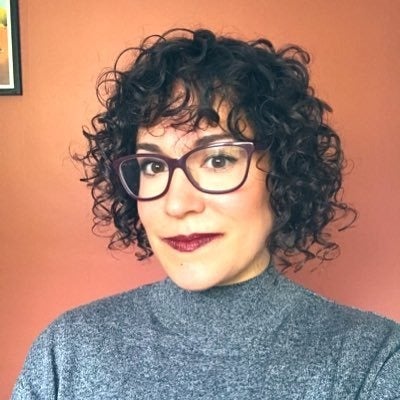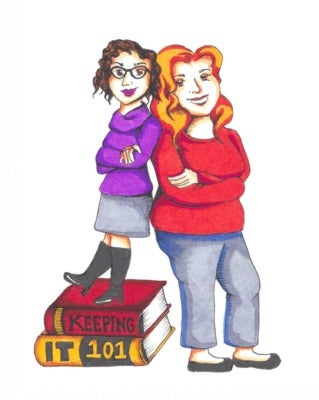Ilyse Morgenstein Fuerst gets really mad at calendars.
Sure, the University of Vermont Associate Professor and Associate Director of the campus’ Humanities Center is also a mom and a popular podcast host, so she’s busy and maybe overscheduled…but that’s not why she’s mad. 
“Our calendar is Christian, we don’t have a secular calendar,” Morgenstein Fuerst said. “What would it look like if schools had an interfaith calendar?”
“It’d be dope in the year 2021 if my second grader didn’t need to explain what Jewish holidays are,” she added, noting it’s a real issue when students are penalized or must make up hours for unexcused absences when they have to worship during a school day.
Morgenstein Fuerst calls her calendar quest “drop in the bucket activism,” a term her grandfather coined.
Drop in the bucket activism essentially asks the question: How can small, seemingly insignificant acts accumulate over time to create meaningful change? This means using a Sudanese or Asian name instead of an Anglo-Christian one in a textbook word problem, helping an elementary school teacher include Black Muslims during a Black History month lesson plan, or helping a company realize it’s better not to schedule a company picnic or team meal during Ramadan.
While Morgenstein Fuerst says she can’t measure these little drops, and doesn’t know how much change they effect, it’s what she feels comfortable doing.
“This is not all the work, it’s not even a tenth,” she said. “But we start and eventually we get 10 percent done. And then we keep going.”
It’s pretty simple to understand, and the lifelong jock explains further with a sports metaphor.
“People quit if they don’t win. You have to put the ball in the net,” Morgenstein Fuerst said. “These are all ways to get comfortable, to get to the next game or scrimmage.”
It’s about getting you to feel like this is a good business or social or school decision, so you keep making those decisions. Which is a lot more than just drops in a bucket. It’s actually religious literacy. A critical component of religious pluralism.“There are more than a few religions, there is religious plurality within specific religions, and we ignore this fact at our peril. It is important for issues of safety, representation, accountability, and legibility,” she said. “Religious pluralism is just a fact.”
What Morgenstein Fuerst really cares about is religious literacy, and thereby pluralism, from a social justice standpoint. To understand, you need to know a little more about how she got here.
When Morgenstein Fuerst was a college freshman, three weeks into her first semester, September 11 happened. She was ironically in a class on religion with one of only two Muslim faculty.
As a native of the New York/New Jersey area, with cousins who worked in the World Trade Center, she was struck like so many others.
But there was more. Morgenstein Fuerst is the daughter of post-Holocaust Jews who grew up part of an anti-Zionist community. Her dad was drafted to fight in Vietnam. All these things mean justice was (is) important to her family. The way she puts it, “my family didn’t survive all that to participate in racism.”
So Morgenstein Fuerst decided to put her money where her mouth was, to “arm” herself to do work she thought was worth doing and would allow her to be involved in social justice movements.
Her instinct and path ─ expertise in Islam, religions of South Asia and theories and histories of religion ─ paid off.
“Twenty years later, look at the hate crimes,” Morgenstein Fuerst says of where we are today. “What it’s really about is the intersection of hate and the racialization of religion.”
That is something her Generation Z students are good at seeing – that an incident or story can feel like it’s about race even though it’s about religion or feel like gender when it’s really race.
Understanding that is more critical today than ever.
“Americans are really good at hiding religion because of White Protestantism.” Morgenstein Fuerst said. “And race and religion function in a similar way, you learn lessons from that.”
“If we don’t pay attention to religion, we’re missing a place to do racial justice work,” she said. “Take all those white-centered, anti-racist reading lists. Could we get some religion up in there? How do we add to that, not subtract? It’s about supplementing. We want you to read the [Ibram X] Kendi, but also Todd Green on fear of Muslims, because we need to pay attention to how those things are tied up.”
Morgenstein Fuerst says the key is to “move to cooperation instead of competitiveness.”
“I know there’s a market for attention, but I’m curious to know what it would look like if a local Black Lives Matter teamed up with religious literacy work,” she opined. “Loads of people in those movements are based in racialized communities. So how do we get those conversations rocking?”
One way Morgenstein Fuerst is doing that is through her podcast, Keeping it 101: A Killjoy’s Introduction to Religion.
 The basic premise is “you might be done with religion, but religion isn’t done with you.” Essentially stories, lots of first-person anecdotes, specific examples of how religion, and race, impact our society and lives.
The basic premise is “you might be done with religion, but religion isn’t done with you.” Essentially stories, lots of first-person anecdotes, specific examples of how religion, and race, impact our society and lives.
So, once again, she’s building religious literacy. And helping counter so much of the conservative pop culture material out there (she sites Glenn Beck’s book as an example of all her dad can find from the public library).
“This way we’re helping people develop a vocabulary and context, and see through some of what doesn’t make sense,” Morgenstein Fuerst added.
A year after she and her co-host/best friend started Keeping it 101, they have had more than 40,000 downloads, have been heard on every continent, and are on 30 syllabi.
After three seasons and a summer of episodes, with topics spanning nationalism, cults, race and culture, the browning and demonization of race in pop culture, and religious noise, the next season dives into world religions and questions Morgenstein Fuerst and her co-host wish people would stop asking them.
Like about the hijab, which she compares to asking women about pants. Though she knows how important these conversations are.
“Our podcast is meant to translate academic knowledge about religion to a broad audience and we foreground the stakes, focusing almost exclusively on accountability, harm caused, and places that religious actors can do or have done better,” Morgenstein Fuerst said. “It’s all done in the spirit of education – when we know better, we can do better, following Maya Angelou – and in the spirit of equity.”
Just like her relentless local work around calendar reform.
Ilyse Morgenstein Fuerst is part of Religion & Society’s Powering Pluralism Network’s cohort on religious literacy. Learn more about the Powering Pluralism Network.
The views and opinions expressed in this blog do not necessarily reflect those of the Aspen Institute.

